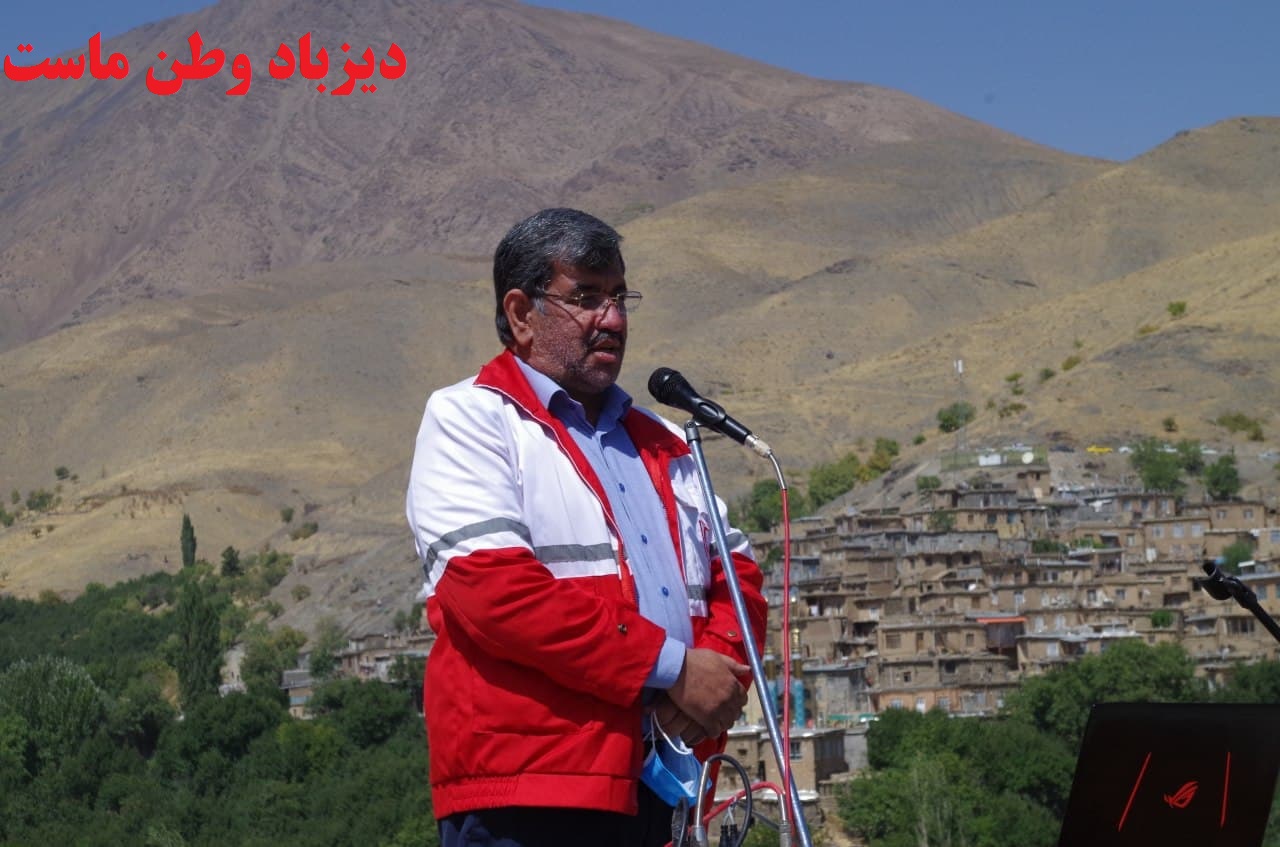
دیزباد وطن ماست
سایت رسمی روستای دیزباد علیا (بالا) از توابع شهرستان نیشابور در استان خراسان رضوی ایران.
دیزباد وطن ماست
سایت رسمی روستای دیزباد علیا (بالا) از توابع شهرستان نیشابور در استان خراسان رضوی ایران.Khaki Khurasani Dizbadi
Dizbad Watane Mast: Khaki Khorasani is the name of a famous poet in Dizbad which you can see an article about his character in the IIS website.
Khaki Khurasani, Imamquli, Isma'ili poet and preacher of 17th-century Persia (b. Dizbad; d. Dizbad, after 1056 AH / 1646 CE). He was born in Dizbad, a village in the hills half way between Mashhad and Nishapur, which at the time was the largest dwelling place of the Isma'ilis of northern Khurasan.
Little is known about his life and education but, judging from his poems, he was a talented poet and well versed in Islamic religious sciences. It appears that a visit to Dizbad by the thirty-sixth Isma‘ili Imam, Murad Mirza (d. 981/1574), left a lasting impression on the youthful Khaki, prompting him to devote his entire life to the preaching of the Isma‘ili faith. Local narratives of his encounter with the Isma‘ili Imam, which is reminiscent of the encounter of Jalal al-Din Muhammad Rumi with Shams Tabrizi, soon turned into legend and caused the inauguration of a new milestone in the cultural history of his native place that has survived to this day. Though not as a religious ceremony, on the last Friday of the month of Mordad in the Persian calendar (middle of August), people of Dizbad of all religious persuasions gather together in the depth of a gorge called Nowhasar to pay homage to the place where Khaki was blessed and granted spiritual insight by the Imam.
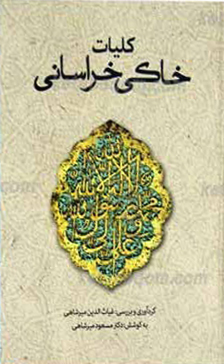
Khaki seems to have been born during the reign of the Safawid Shah Tahmasb (r. 930-84/1524-76). He recounts in his poems the name of Shah ‘Abbas I (r. 1587-1629) and was a contemporary of Shah Safi (d. 1052/1642), and ‘Abbas II (d. 1077/1666). He was also contemporary to three Isma‘ili imams, namely Murad Mirza, Dhu’l-fiqar ‘Ali (d. 1043/1634), and Nur al-Din, nicknamed Nur al-Dahr (d. 1082/1671). His Isma‘ili preaching seems to have been successful enough to attract the attention of the Safawid king, probably ‘Abbas I, which led to his arrest and torture, but unlike his predecessor, the poet Abu’l-Qasim Muhammad Amri Shirazi (d. 999/1590), he was not blinded and killed (Daftary, 1994, p. 456). About the year 1640, the relationship between Isma‘ili imams and Safawid kings improved to the extent that Nur al-Din accompanied Shah ‘Abbas II on his visit to Mashhad in 1642, when Khaki was probably released and returned to his home in Dizbad (Ibn Ya‘qubshah).
Nothing in prose has remained from Khaki, but the corpus of his poetic compositions comprises over 5,000 couplets which constitute his collection of poetry (diwan), and a lengthy (ca. 1,300 couplets) religious mathnawi entitled Tulu‘ al-shams. Two shorter versified treatises, Nigaristan and Baharistan (two qasidas in 980 and 79 verses, respectively), have also survived (Poonawala, pp. 279-80; Daftary, 1994, p. 123). The poems that have survived to our time seem to have been compiled later in his life. The content of Khaki’s religious writings fully complies with the late and post-Alamut Isma‘ili theological texts and the writings of Nasir al-Din Tusi (d. 671/1274), Khayrkhwah Harati, and Abu Ishaq Quhistani. Khaki is said to have lived a long life; the location of his grave, though without a gravestone, is known to the local residents of Dizbad.
Bibliography:
Farhad Daftary, The Isma‘ilis: Their History and Doctrines, Cambridge: Cambridge University Press, 1990.
Idem, Ismaili Literature: A Bibliography of Sources and Studies, London and New York, 1994.
Z. Jeferali, “Khaki Khurasani,” in The Great Ismaili Heroes, Karachi, 1973, pp. 95-97.
Ibn Ya‘qubshah Sufi, Poems in Praise of the Ismaili Imam Nur al-Din, Mss, Institute of Ismaili Studies, no. 14708.
Imam Quli Khaki Khurasani, Diwan (selections of), ed. Wladimir Ivanow as An Abbreviated Version of the Diwan of Khaki Khorasani, Bombay, 1933.
Ismail K. Poonawala, Biobibliography of Isma‘ili Literature, Malibu, Calif., 1977.
This is an edited version of an article that was originally published in Encyclopaedia Iranica, Online Edition, November 2006
تصاویر دیزباد در سایت Summit Post
«دیزباد وطن ماست»- سایت سومیت پست یکی از فضاهای مناسب برای به اشتراک گذاری عکس از مناطق گردشگری جهان است که در یک بخش خود به دیزباد پرداخته و عکس هایی که البته نه چندان جدید هستند را از دیزباد به اشتراک گذاشته است.
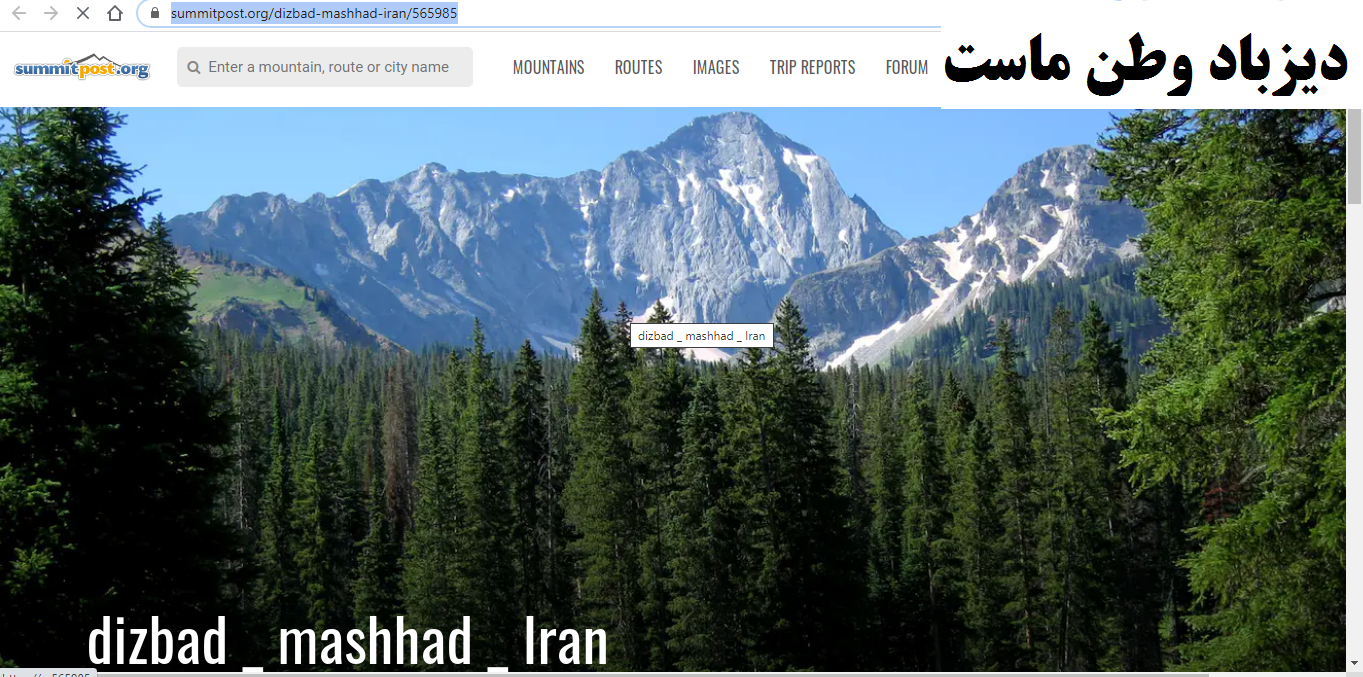
پیش بینی 15 روزه آب و هوای دیزباد
«دیزباد وطن ماست»- خوشبختانه در سال های اخیر پیش بینی آب و هوا در سایت های مختلف برای روستاها میسر شده است و لذا در سایت ودر اونیو نیز می توانید پیش بینی هوای دیزباد را برای 15 روز در اختیار داشته باشید.
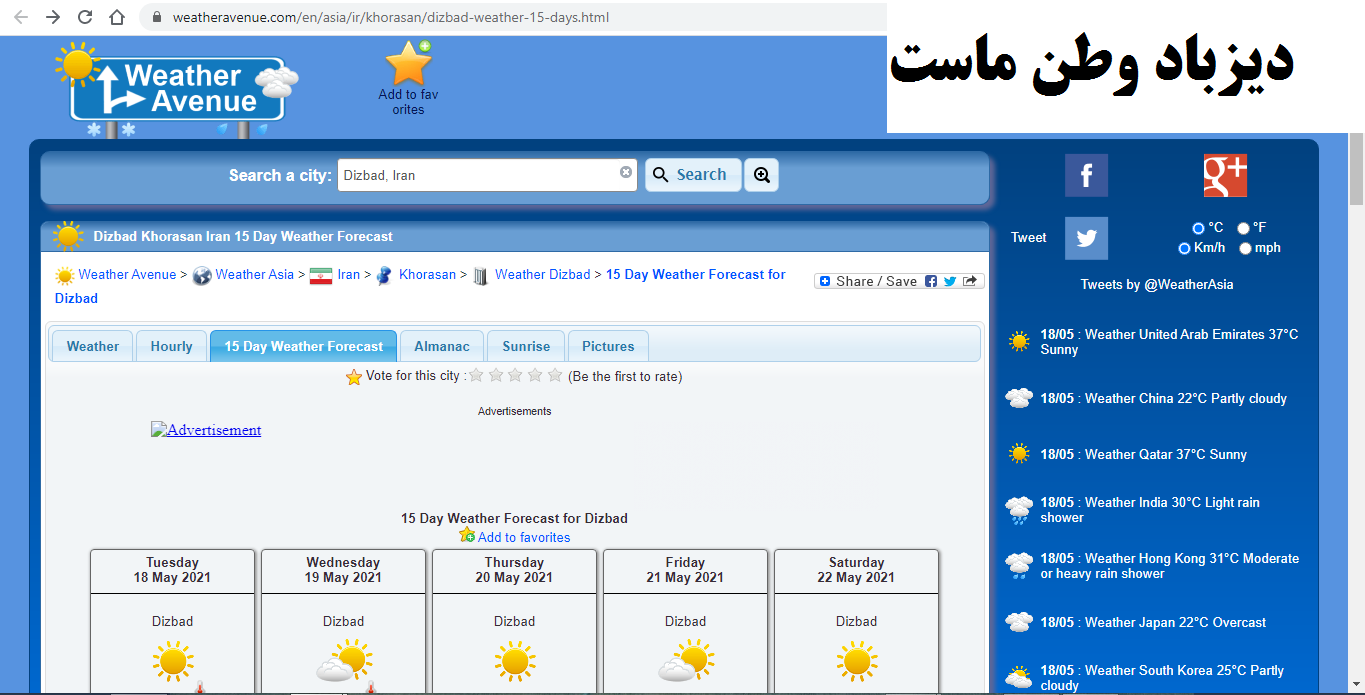
بهره برداری از 2 ایستگاه امداد و نجات خانه هلال دیزباد
«دیزباد وطن ماست»-خانه هلال دیزباد علاوه بر تامین امکانات و ارائه کمک ها و امداد اولیه در دفتر مرکزی ، دارای 2 ایستگاه جدید شد.
به گزارش دیزباد وطن ماست، در جلسه آغازین بهره برداری از دفتر پروژه حفاظت و تکثیر گونه های با ارزش گیاهی در بوستان روستایی دیزباد با حضور فرماندار شهرستان زبرخان ، معاون سرمایه گزاری اداره کل میراث فرهنگی، صنایع دستی و گردشگری، روسای ادارات منابع طبیعی ، محیط زیست،میراث فرهنگی صنایع دستی و گردشگری، بنیاد مسکن شهرستان نیشابور و جمعی از اهالی دیزباد، بهره برداری از ایستگاه امداد و نجات دیزباد آغاز شد.
ایستگاه شماره 1 در محل سر مزار و ایستگاه شماره 2 در دفتر بوستان پیشتختگاه قرار گرفته است.
هم اینک برخی اقلام مورد نیاز در کمک های اولیه امداد و نجات برای ایستگاه شماره 1 تامین و در دسترس هم دیزبادی ها قرار دارد.
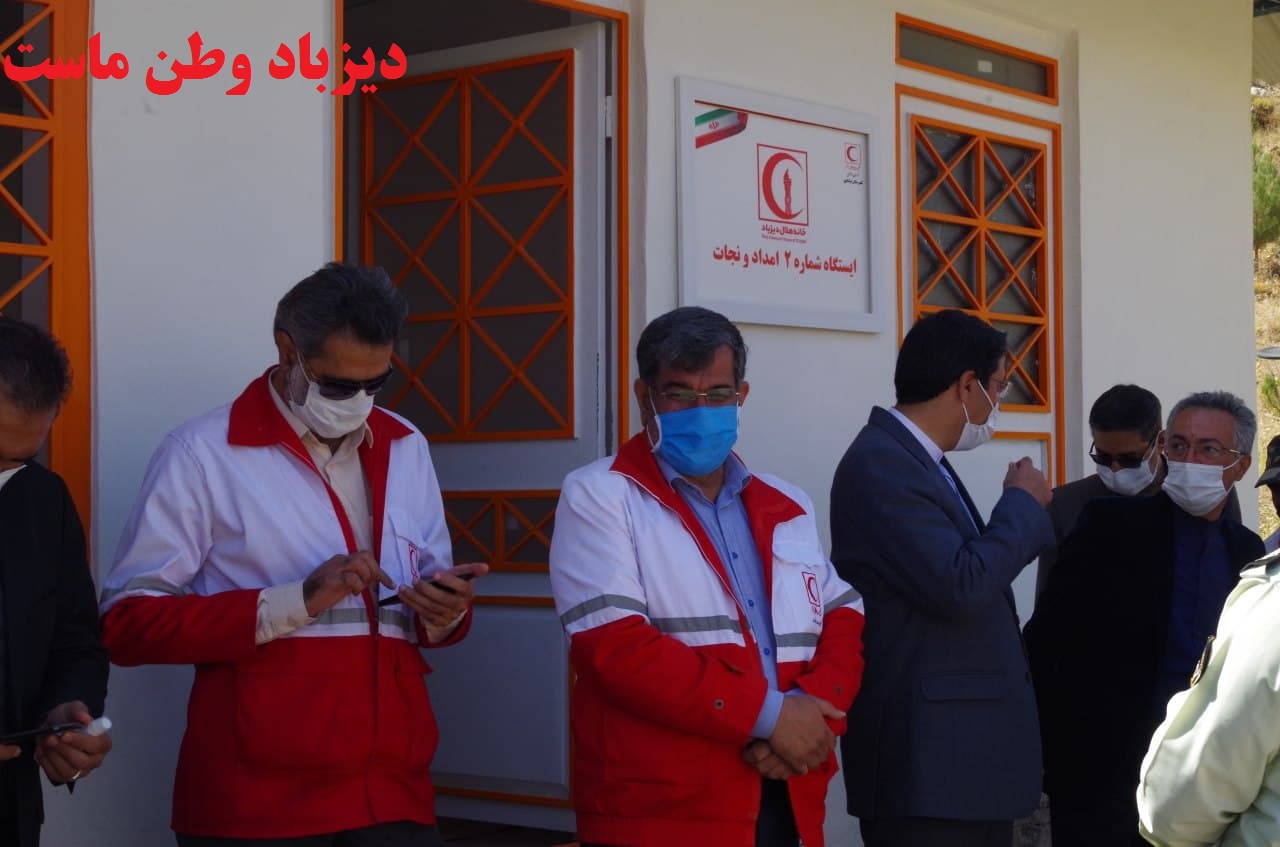
خانه هلال دیزباد؛ نخستین خانه هلال در ساختار جدید
«دیزباد وطن ماست»- مهندس اسماعیل شاه بیگی معاون مدیرعامل استان و رئیس جمعیت هلال احمر شهرستان نیشابور از فعالیت های خانه هلال دیزباد و کمک های سخاوتمندانه اهالی در امداد رسانی به حادثه دیدگان استانهای کرمانشاه ، گلستان و سیستان و بلوچستان تقدیر کرد.
به گزارش دیزباد وطن ماست، شاه بیگی افزود: "اولین خانه هلال روستائی استان (در ساختار جدید) در روستای دیزباد بالا تاسیس شده است.
وی گفت: خرسندیم که خانه هلال دیزباد یکی از فعالترین خانه های هلال کشور بوده و امروز به ابتکار عزیزان دیزبادی خانه هلال دیزباد اولین خانه هلال کشور است که 2 ایستگاه امداد و نجات را راه اندازی می کند.
